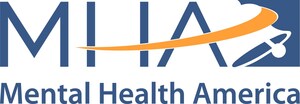Responses to Mental Health America's Online Screening Program Show Significant Need, Interest in Mental Health Services among Racial, Ethnic Minorities
July is National Minority Mental Health Awareness Month
ALEXANDRIA, Va., July 14, 2014 /PRNewswire-USNewswire/ -- There is significant interest and need in mental health services among people who identify as belonging to a racial or ethnic minority, data from Mental Health America's new online screening site show.
Responses of individuals from racial and ethnic minorities indicate that they are more likely than whites to report that they would monitor their health by taking screens regularly. And they are also more likely to want a way to privately contact a peer to discuss results.
In April, Mental Health America launched an expanded online screening site (www.mhascreening.org) that provides simple, straightforward and completely confidential tools that people can use to assess their own mental health needs. If an individual needs help, they can get a referral to an MHA affiliate in their area to assist in finding appropriate services.
Mental Health America is releasing the data to coincide with the July observance of National Minority Mental Health Awareness Month.
Since the launch of the site, 11,869 individuals who identify as belonging to a racial or ethnic minority have taken a screening. The initial results show:
- 29.6 percent wanted additional information about where to go to start getting mental health help and 27.9 wanted online, self-help application or tools to help with their health. Both these rates are virtually identical to white respondents.
- Asian Americans were most likely to take the Depression Screen; Native Americans were most likely to take the Anxiety Screen; African Americans were most likely to take the Bipolar Screen; and Native Americans were most likely to take the PTSD Screen.
- Racial and ethnic minorities were more likely than whites to report that they would monitor their health by taking screens regularly (7.2 percent versus 5.9 percent) and take another screen immediately (16.9 percent versus 13.7 percent). They were also more likely to want a way to privately contact a peer to discuss results and next steps (16.9 percent versus 13.8 percent).
- Individuals who identified as Biracial were most likely to score as having "Severe Depression" (40.6 percent), "Severe Anxiety" (46.6 percent), and "Positive for Bipolar" (59.9) percent.
- Native Americans were mostly likely to screen "Positive for PTSD" (81.3 percent).
"This screening site underscores our commitment to breaking down long-standing barriers and promoting early identification and early intervention," said Paul Gionfriddo, president and CEO of Mental Health America. "That—not just waiting for a crisis to occur— is the key to protecting and preserving mental health and finding effective treatment.
"We view these results as demonstrating both significant needs and significant interest in communities of color for mental health services," Gionfriddo commented. "They are a clear call to action to invest more heavily in bringing mental health programs and services to every population in America."
Gionfriddo said Mental Health America will be responding by promoting during the coming year broad-based prevention and early intervention and identification initiatives across all communities, especially those targeted to children and young adults. It will also promote models for integrating behavioral health care with educational programming for children in schools that can be shared with and implemented by local school districts in collaboration with local providers and local affiliates.
"These efforts are essential because mental illnesses are often diseases of childhood and there is a long lead time between the emergence of symptoms and the receipt of appropriate care," he said. "These are the only chronic diseases for which we typically wait until Stage 4 to treat, and we must make early detection and intervention our goal. But our families, schools, and health care providers aren't currently equipped to address these issues."
Studies have shown that African Americans and Hispanics initiate care less often than whites. While 40 percent of whites with a probable need for mental health care seek treatment, only 27 percent of Latinos and 24 percent of Blacks do. The disparity in use of mental health care is even higher for minority youth than adults and much higher than other areas of health care.
Mental Health America (www.mentalhealthamerica.net), founded in 1909, is the nation's leading community-based network dedicated to helping all Americans achieve wellness by living mentally healthier lives. With our 228 affiliates across the country, we touch the lives of millions—Advocating for changes in mental health and wellness policy; Educating the public & providing critical information; and delivering urgently needed mental health and wellness Programs and Services.
SOURCE Mental Health America
WANT YOUR COMPANY'S NEWS FEATURED ON PRNEWSWIRE.COM?
Newsrooms &
Influencers
Digital Media
Outlets
Journalists
Opted In





Share this article